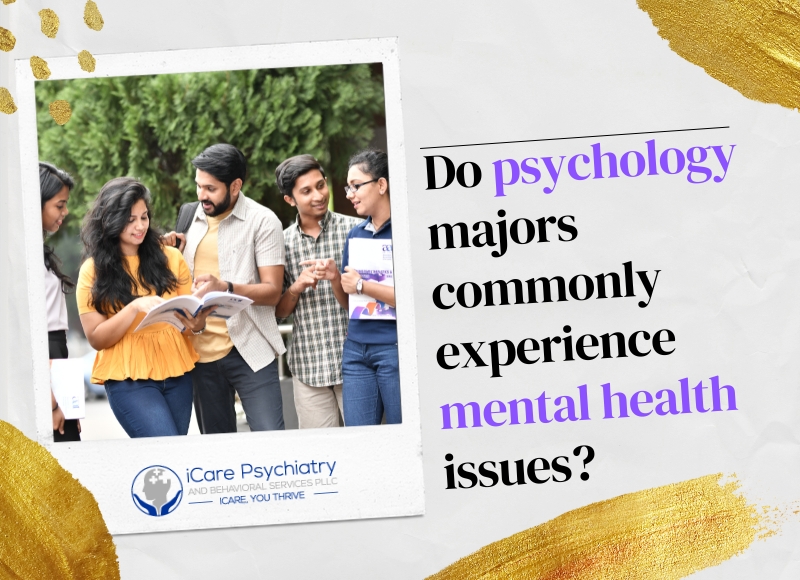It’s a common idea that psychology students and professionals face mental health issues more often. Research shows psychology students are often introverted, serious, and anxious. There’s also the ‘wounded healer’ concept, suggesting therapists may have dealt with their own mental health challenges. These dynamics show a complex link between studying psychology and mental well-being.
Theoretical Background mental health issues
It’s a common stereotype that psychologists or their families are more prone to psychological problems than the average population. Empirical evidence supports this notion, with studies revealing traits like introversion, seriousness, and a tendency towards anxiety among psychology students.
Furthermore, research indicates that psychotherapists often have insecure attachment styles, hinting at challenging family dynamics. These findings highlight the complex relationship between the field of psychology and mental health, raising important questions about the well-being of those who study and practice within it.
The Myth of the Invulnerable Mind
One prevailing misconception is that psychology students, armed with knowledge about mental health and coping mechanisms, are immune to mental health struggles themselves. However, research suggests otherwise. Studies have found that psychology students often experience levels of stress, anxiety, and depression comparable to or even higher than those in other disciplines. The pressure to excel academically and the emotional demands of studying human behavior can affect mental well-being.
Potential Reasons for Mental Health Challenges
Several factors may contribute to the heightened vulnerability of psychology majors to mental health issues:
- Emotional Intensity: Psychology coursework delves into sensitive topics such as trauma, addiction, and psychological disorders. Constant exposure to distressing material can impact students emotionally, leading to compassion fatigue or vicarious traumatization.
- Self-Reflection: When one embarks on the journey of studying psychology, it requires a great deal of introspection and self-analysis. This process of self-awareness can bring to the surface personal struggles or unresolved issues, which can trigger psychological distress. It is important to tread carefully and seek support when needed, as this process can be emotionally challenging.
- High Expectations: Aspiring psychologists often face immense pressure to embody the fundamental principles they learn in their field of study. These principles primarily revolve around being an empathetic listener and an effective problem-solver. However, trying to meet these expectations while juggling a psychology program’s academic demands can be incredibly stressful. This pressure to excel and meet expectations can leave students feeling overwhelmed and inadequate in their abilities, leading to further stress and anxiety.
- Stigma and Shame: Despite the growing awareness and acceptance of mental health issues, the stigma surrounding mental health still persists, both within society and academic communities. This is particularly true for psychology students, who may be hesitant to seek help due to fears of being judged or concerns about appearing “weak” in a field that emphasizes understanding and managing mental health. As a result, these students may struggle in silence, which can lead to serious consequences for their overall well-being and academic performance.
Support and Self-Care Strategies for Mental Health Illness
While navigating the challenges of studying psychology, it’s crucial for students to prioritize their mental well-being. Here are some strategies for self-care and seeking support:
- Establish Boundaries: It is crucial to establish clear limits on how much emotional energy you invest in psychology coursework or extracurricular activities. As you navigate challenging assignments and demanding engagements, it is easy to become too immersed in the subject matter and neglect your well-being. Therefore, it is essential to prioritize your own needs and take breaks when necessary to avoid burnout. Remember, taking care of yourself is as important as excelling academically.
- Cultivate Self-Compassion: We ought to recognize and accept that imperfections are an inevitable part of the human experience, even when we strive towards mental wellness. By acknowledging our struggles and allowing room for mistakes, we can foster a sense of self-acceptance and resilience, ultimately leading to a more fulfilling and balanced life.
- Seek Peer Support: Connect with fellow psychology students who may share similar experiences and understand your challenges. Peer support groups or study buddies can provide a sense of camaraderie and validation.
- Utilize Resources: Take advantage of mental health resources offered by your university or college, such as counseling services, support groups, or workshops on stress management and resilience.
- Destigmatize Help-Seeking: Challenge the notion that seeking help is a sign of weakness. Normalize conversations about mental health within academic settings and advocate for inclusive, supportive environments where students feel empowered to prioritize their well-being.
Summarizing
Students who are pursuing a major in Psychology may face mental health challenges due to the demanding coursework and emotional intensity of the subject matter. It is important to seek help from mental health professionals or university resources if you or someone you know is struggling with mental health. Remember, our experts at iCare provide specialized support for mental health and psychological issues, making it a valuable resource for students who may need it.


Thanks in favor of sharing such a pleasant
thinking, paragraph is good, thats why i have read it